Rabbinic Literature
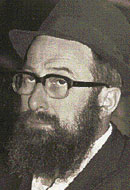 Messianic Temptations
Messianic TemptationsThursday, April 7, 2011 by Yehudah Mirsky | Jewish Ideas Daily » Daily Features
The downfall of Moshe Katsav, the former president of Israel recently convicted and sentenced on a rape charge, is a many-sided episode—involving his crimes, the media circus around the judicial proceedings against him, and the private and public meanings of his disgrace.
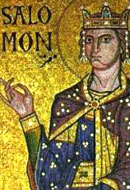 Seeking Solomon
Seeking SolomonTuesday, March 29, 2011 by Eve Levavi Feinstein | Jewish Ideas Daily » Daily Features
For traditionalists, the biography of King Solomon is enshrined in the Bible, in the narrative accounts in the books of Kings and Chronicles. The son of King David, who spent his career battling Israel's enemies, Solomon is depicted as ushering in an era of peace and prosperity. Yet the Bible also relates that Solomon took numerous foreign wives and concubines—one thousand in total—who led him to worship foreign gods and build shrines for their service.
 Three Blessings
Three BlessingsWednesday, March 23, 2011 by Yehudah Mirsky | Jewish Ideas Daily » Daily Features
The Jewish prayer book (siddur) is thick with texts: blessings, thanksgivings, and petitions, instructions, theological claims, and historical memories. Some traditional texts bear especially outsized burdens. In this respect, few can rival three lines that begin "Blessed are you O God, King of the Universe, Who has not made me . . . " and conclude, respectively, "a goy [Gentile]," "a slave," and "a woman."
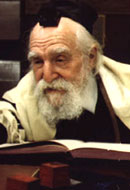 Halakhah for Americans
Halakhah for AmericansFriday, March 18, 2011 by Elli Fischer | Jewish Ideas Daily » Daily Features
Asked in a 1975 New York Times interview how he had acquired his standing as America's most trusted authority in Jewish religious law (halakhah), Rabbi Moshe Feinstein (1895-1986) replied: ''If people see that one answer is good and another answer is good, gradually you will be accepted."
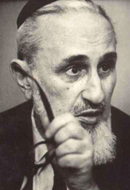 The Virtuoso of Judaism
The Virtuoso of JudaismThursday, March 3, 2011 by Yehudah Mirsky | Jewish Ideas Daily » Daily Features
Religious virtuosity comes in many forms. One of them is the ability to reconcile seeming irreconcilables, like faith and freedom, piety and intellect, revelation and science. The dream of synthesis has lured many in the past two centuries. One who seemed to live it was Joseph B. Soloveitchik.
 The Riddle of the Satmar
The Riddle of the SatmarThursday, February 17, 2011 by Allan Nadler | Jewish Ideas Daily » Daily Features
A prospect terrifying to secular Israelis and Zionists worldwide has been the rapid growth of the Jewish state's ultra-Orthodox (haredi) community. Given the stranglehold of haredi political parties on recent coalition governments, and the encroachments by non-Zionist haredi clerics upon Israel's chief rabbinate, once religiously moderate and firmly Zionist, the fear is not entirely irrational.
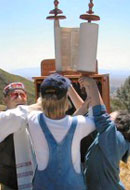 Spirituality Lite
Spirituality LiteTuesday, February 15, 2011 by Aryeh Tepper | Jewish Ideas Daily » Daily Features
A simple truth lurks behind the rise of "post-denominationalism" in Jewish religious life. It is that increasing numbers of Jews are becoming less interested in defining what Judaism means than in sampling aspects of the Jewish tradition that seem to promise spiritual vitality.
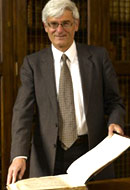 Talmud: The Back Story
Talmud: The Back StoryThursday, January 27, 2011 by Yehudah Mirsky | Jewish Ideas Daily » Daily Features
There is no getting away from the Babylonian Talmud. Love it, hate it, or both, this monumental work has been central to Jewish life for a millennium and more, managing time after time to find new readers and to summon new forms of reading.
 Who Needs Hebrew?
Who Needs Hebrew?Thursday, January 6, 2011 by Yehudah Mirsky | Jewish Ideas Daily » Daily Features
In 1967, on a visit to Jerusalem, the American novelist Saul Bellow met Shmuel Yosef Agnon, Israel's Nobel laureate in literature. "This spare old man," Bellow would recall, "asked me if any of my books had been translated into Hebrew. If they had not been, I had better see to it immediately, because, he said, they would survive only in the Holy Tongue."
 Law and Morality
Law and MoralityMonday, December 27, 2010 by Yehudah Mirsky | Jewish Ideas Daily » Daily Features
Are ethics and law at odds? Does the law define what is ethical, or do ethical concerns have their own purchase on the law? These questions, universally applicable, have special relevance to a religious culture like Judaism, whose traditional law is embodied in the vast corpus of halakhah.
Editors' Picks
Hominid-Lupine Transmogrification J. Remus Bloch, Zoo Torah. Viz., metamorphosis from bipedal omnivorous hominids into lupine carnivorous canids. (Some "Purim Torah" on the werewolf)
Raising Cane Benjamin of Tudela, Mostly Kosher. How did the story of a debtor hiding gold inside a walking cane (both to deceive his creditor and to avoid technically lying under oath) make its way from the Talmud to Don Quixote?
Mourning, Melancholia, and Maimonides Jon Sommer, Zeek. Perhaps because a number of medieval Jewish philosophers were also mathematicians and astronomers, their writings on suffering offer commonsensical guidance still useful today.
Crisis of Succession Yair Ettinger, Haaretz. Yosef Shalom Elyashiv, the spiritual leader of Israel's Lithuanian Haredi community, has never chosen a successor. Now that he is critically ill, the Haredi world may soon be facing a power struggle.
Must a Jew Believe Anything? Menachem Kellner, Book of Doctrines and Opinions. According to one Maimonides scholar, dogma is a device for determining who is "out," whereas the demand of the hour is finding ways of keeping Jews "in." (Interview by Alan Brill.)
A Mask for Janus Margalit Fox, New York Times. For a generation of Reform Jews, the commentary of the recently deceased W. Gunther Plaut heralded a return to Hebrew scripture. But it also made new interpretations permissible.
With These Words Fred MacDowell, On the Main Line. With one salty term of consecration (possibly an obscene rhyme), a Jewish man may have betrothed a woman. In 1823, the rabbis of London had to deal with the consequences.
Why Not Covet? Elchanan Samet, Virtual Beit Midrash. Reasons for the tenth commandment (found in this week's Torah portion): practical, psychological, moral, spiritual.
Creaming the Competition Elli Fischer, Jerusalem Post. Ruling Haagen Dazs ice cream to be non-kosher, the Israeli chief rabbinate misconstrues Moshe Feinstein's position and once again demonstrates its contempt for Diaspora Judaism.
A Separate Peace Tamar Rotem, Haaretz. A Gur Hasid, who practices a strict sexual separation, will not walk with his wife on the street. He will not call her by name. To address her, he will knock on the table. Or hum.

